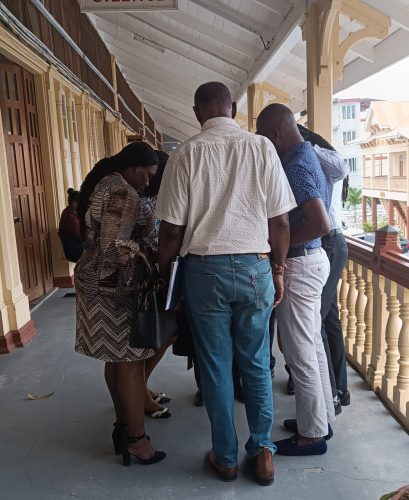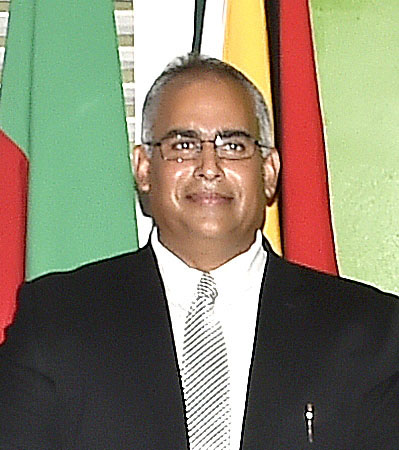-says strike legal and justified, gov’t to appeal
By Abigail Headley
In a comprehensive win for the GTU, Justice Sandil Kissoon yesterday ruled that the strike launched by the union for collective bargaining was legal and justified and therefore deductions cannot be made by the state from the salaries of striking teachers.
He also castigated testimony before the court by the Chief Education Officer (CEO) Saddam Hussain as not credible and criticised the Chief Labour Officer Dhaneshwar Deonarine for not taking steps to bring the four-week-long strike to an end.
The Guyana Teachers’ Union (GTU) had gone to court to challenge the government’s decision to deduct pay from striking teachers and the intention to cease deductions of dues from teachers’ pay in favour of the union.

In his decision, Justice Kissoon said “Teachers lifted their voices and they asked for bread, they were given stones”.
He declared that the government’s actions, which included deducting pay from striking teachers and ceasing deductions of dues for the union, were unconstitutional, unlawful, and interfered with the fundamental rights guaranteed to the union for collective bargaining.
The judge emphasized that striking is a legitimate right and does not equate to “no work, no pay.” He further criticized the government for failing to engage in meaningful discussions with the union for over three years, despite multiple attempts by the union to initiate dialogue. The court also found that government officials rebuffed efforts for negotiation and mediation, leading to the prolongation of the strike.
“The evidence before this court reveals and I so find, that all efforts by the union to commence the process of meaningful engagement and collective bargaining to address the issues of wages and salaries and matters pertaining, relevant to the conditions of their employment were rebuffed or were not addressed,” Justice Kissoon noted.
The ruling also highlighted as discriminatory, the government’s actions against the GTU, specifically targeting the union’s financial resources and attempting to undermine its authority. Of particular note was President Irfaan Ali’s meeting with some teachers at State House, which Justice Kissoon criticized as not constituting collective bargaining with the recognized union. On this note, he questioned how a nationwide consultation involving union members could take place without the union’s participation.
Furthermore, the judge condemned CEO Hussain, and CLO Deonarine, for their lack of transparency and failure to fulfill their duties in mediating the dispute between the union and the government. The CEO, Justice Kissoon said, was not frank with the court during cross-examination and his testimony could not be relied upon.
On the topic of the CLO, the judge said that his failure to intervene contributed to the strike action. Justice Kissoon noted that there was no evidence that Deonarine conducted a single inquiry to ascertain what was in the correspondence sent to him by the union before deciding that the strike was illegal.
“It highlights a grave (omission) for which the children of this nation suffered,” the judge said.
Meanwhile, in terms of the cross-examination of GTU’s second Vice President Julian Cambridge, the judge found his testimony to be credible.
The decision to cease deductions of union dues and cut the salaries of striking teachers was deemed unconstitutional and grounded in bad faith, demonstrating a violation of the right to freedom of association. The court also criticized the government’s refusal to negotiate increased salaries with the GTU and its unilateral imposition of wage increases without proper collective bargaining.
Outside the court yesterday, GTU President, Mark Lyte, warned of the possibility of further strikes if the government does not engage in negotiations regarding the pending proposal for 2019-2023, although he expressed hope that this could be avoided. He characterized the court ruling as groundbreaking, providing a platform for other unions to advocate for collective bargaining. He further emphasized the importance of giving teachers and workers a voice, stating that the decision has revitalized teachers.
Meanwhile, a disappointed Attorney General (AG) Anil Nandlall SC, who represented the state in the matter, revealed that the state will be appealing the judge’s decision. The AG expressed concerns that the ruling from Justice Kissoon could potentially set a precedent that would require employers to pay striking workers. He argued that this decision could lead to workers being compensated for work they did not perform, which he viewed as a violation of property rights. Further, he pointed out that the deduction and remittance of union dues were voluntary, and disagreed that the government’s actions infringed upon the constitutional rights to associate and form a trade union.
The GTU’s industrial action commenced on February 5th and was initially slated to last for ten days but actions by the government led to its continuation for over a month. There was substantial support for it all across the country particularly in Region Two, a development which seemed to have surprised the government. Teachers also went on strike across Berbice.
Just before the commencement of the strike, GTU General Secretary Coretta McDonald had expressed frustration with the government’s handling of negotiations.
According to the union, a proposal that it submitted in 2020, spanning from 2020 to 2023, did not receive a response from the government. Additionally, attempts to request conciliation and arbitration with the Ministry of Labour were unsuccessful.
Despite the union’s claims, correspondence from the CLO, Deonarine to the GTU showed him pointing out that the grievance procedure had not been exhausted as per the agreement between the union and the MoE. Before this correspondence had been sent out, the GTU had written to the CLO seeking arbitration as financial matters were not addressed by the Ministry of Education, and an arbitrator mutually agreed upon by both parties was requested to commence the process.
However, no response was received from the CLO regarding the request for arbitration and the union resorted to declaring full-fledged industrial action due to the government’s failure to address its concerns, including wage increases and non-salary benefits, a lack of response from the CLO, and unresolved matters impacting the stability of the education system. In its correspondence to the government to inform them of the planned strike action, the GTU had requested an urgent meeting with the Ministry of Education to discuss these matters and avoid disruption in the educational system.
After the letter on the planned industrial action was sent out, the CLO finally reached out to the GTU, urging that they refrain from taking industrial action and emphasizing the importance of following the grievance procedure for good industrial relations practice. Deonarine further advised against breaching or violating the Memorandum of Agreement between the GTU and the Ministry.
One day after the strike began, the Ministry of Education made its first move against teachers by announcing its plan to discontinue the deduction of union dues on behalf of teachers. In a press release issued by the ministry on February 6, it explained that the decision to cease deductions was made per a ruling by Chief Justice Ian Chang in the case of Guyana Public Service Union v Nanda Gopaul.
The release cited the ministry as labeling the industrial action unlawful, racist, and divisive. Further, it said that the majority of the union’s requests were agreed upon by the MoE, and the ministry implemented several initiatives to benefit teachers nationwide.
The ministry then took things a step further, on February 12, vowing to cut the salaries of striking teachers. In response to this, the GTU threatened and made good on its threat to take the government to court over the MoE’s actions.
After the union’s statement of claim against the state was filed on February 14, the government, through Nandlall and its other legal representatives, made an application for a 14-day grace period to come up with a response. This was granted and the matter was set for March 20. Justice Kissoon, who granted the extension, also ruled that the status quo be maintained, thereby freezing the deduction of strike days from teachers’ salaries and maintaining the deduction of union dues, pending the outcome of the matter. It was these orders that eventually led to the Judge asking why there were no talks between the two sides and eventually ordering mediation.
On February 27, the CEO Hussain was summoned before Justice Kissoon after being found in contempt of court for issuing a circular which stated that teachers’ salaries wouldl still be subject to deductions and that the court’s ruling was temporary. Hussain apologised to the judge, who, after accepting the apology, suggested that a mediation meeting be held in court between the two parties.
The GTU readily agreed to the meeting taking place the following day, but Nandlall asked the court for 24 hours to confer with his superiors before making a decision. The following day, despite Nandlall’s disagreement with mediation, Justice Kissoon ordered that the meeting be held under the mediation of Senior Counsel Edward Luckhoo and Robin Stoby. The mediation ended the four-week-old strike and led to talks between the union and the ministry which later collapsed over the period to be negotiated over.
Attorney-at-Law Darren Wade represented the GTU, and Attorney-at-Law Roysdale Forde represented The Guyana Trades Union Congress, which participated in the case as an interested party.






